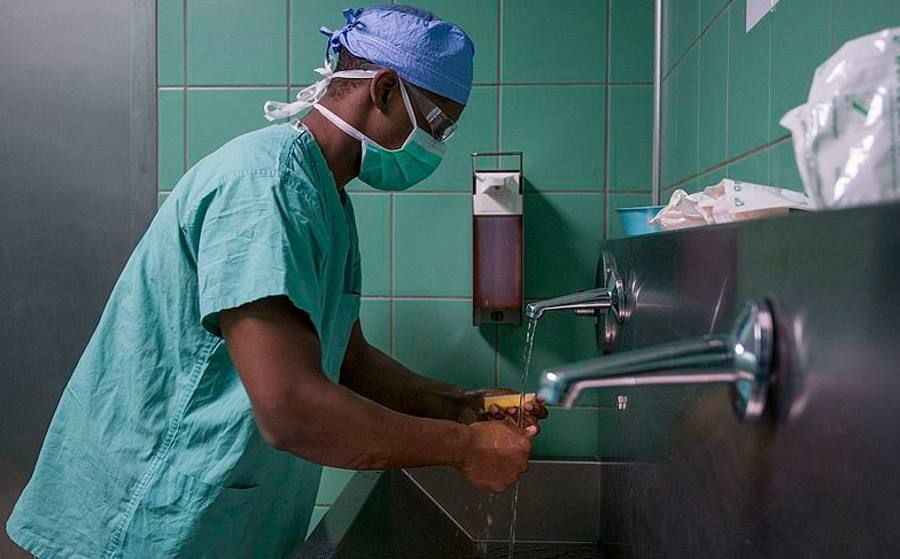
Bacteria are becoming resistant to hospital disinfectants
Even high-potency hospital disinfectant loses effectiveness against superbugs. Squareowks will have to employ other strategies to deal with the threat of – warn scientists on „Science Translational Medicine”.
Bacteria are constantly adapting to the environment around them, and a recent study Enterococcus faecium have started to tolerate alcohol – key ingredient of the middleoin disinfection in hospitals. Alcohol-based hand sanitizers, such as isopropanol, have become widespread as a method of infection control. This has brought many benefits, including a reduction in the rate of methicillin-resistant nosocomial infections Staphylococcus aureus (Staphylococcus aureus), but new research suggests it may have roalso cause unexpected consequences.
A new study thatore concerned specifically witholnie bacteria Enterococcus faecium – one of the mainoof the leading causes of infections in hospitals – showed that the bacteria are becoming increasingly resistant to alcohol. A particular group of bacteria, known as vancomycin-resistant enterococci (VRE), appears to have mutated and begun to tolerate alcohol. Researchers say it’s time to rethink the kind ofoIn disinfection in hospitals.
– This is a wake-up call to the teams ofoin controlling hospitals around the world. If you want to control the emergence of VRE, you need to do more than just rely on alcohol-based disinfection – said Timothy Stinear of the University of Melbourne, coorouter of research. – This is not the end of hand hygiene in the hospital, it is one of the most effective infection control procedures, whichor we have introduced around the world, but we can’t rely solely on alcohol-based disinfectants and for someorious bacteria, such as VRE, we will need additional procedures. Alternative disinfectants, perhaps chlorine-based, must be started – added.
– The problem with VRE is that the bacteria can colonize the intestine and then pass into the bloodstream of the patientoin and cause septicemia or blood infection. It is very difficult to get rid of them because they are resistant to almost all antibiotics – explained Stinear. Those most at risk are those with compromised immune systems – people receiving chemotherapy, after organ transplantsow or people undergoing dialysis.
Stinear along with cooThe researchers tested a total of 139 prosnip Enterococcus faecium – isolateoin bacteria taken from patientsow. Probki were obtained from dwoch hospitals in Melbourne, and taken between 1997 and 2015. Alcohol-based disinfectants were widely introduced in Australia earlier this century. Study results show that bacteria Enterococcus faecium Have become more tolerant to alcohol during this time.
Scientists exposed bacteria in the lab to an isopropanol-based solution for five minutes. After exposure to the solution, it was found that bacteria collected after 2010. were about ten times more tolerant to alcohol-based substances.
However, the solutionor alcohol used in the experiment was not as concentrated as in hospitals, so the teamoł began another round of experimentationow. The researchers took four isolates Enterococcus faecium, of whichorych two in earlier studies showed alcohol resistance and spread them on the surface of mouse cages. They then wiped each cage with isopropanol wipes of the strength used in hospitals. The rodents were then released into each cage and allowed to stay there for about an hour, and after a week they were carefully examined.
Mice, whichore were placed in a cage with a strain of Enterococcus faecium taken in 2012., had large concentrations of bacteria showing clearly that the alcohol-based disinfectant was not as effective as previous strains ofow. PoMore recent strains of bacteria have proved more resistant.
– Our research clearly shows that this is not just a laboratory phenomenon – stressed Stinear, adding that bacteria can survive the standard procedure for infection control.
Additional genetic analysis of alcohol-resistant bacteria revealed that they have developed mutations in specific genes related to cell metabolismork strain. However, resistance to alcohol appears to have a different genetic basis than the bacteria’s resistance to antibiotics in ogole.
Researchers emphasize that more studies are needed on the subject involving more hospitals, nationaloin and strainoin bacteria. More research is also needed, whichore will help establish a definitive link between increased bacterial tolerance Enterococcus faecium, and the introduction of alcohol-based disinfectant in hospitals.


